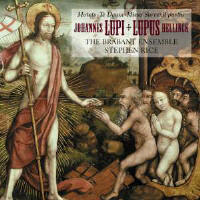Texte paru dans: / Appeared in: |
|
|
Reviewer: J.
F. Weber
Joining the obscure early
16th-century composers that Stephen Rice has been promoting are two
contemporaries whose names are intriguingly juxtaposed on the cover. Lupus
Hellinck (1493/4–1541) came from Bruges, while Johannes Lupi (c. 1506–1539)
came from Cambrai, but Rice does not call them contemporaries, for even
though they died only two years apart, at the time Hellinck was ordained a
priest Lupi was only a choirboy at Cambrai (over a century after Guillaume
Du Fay was singing there). Hellinck had earlier been a choirboy at St.
Donatian in Bruges, where he later served as succentor. The last name of one
and the first name of the other are linked together on the cover in a play
on words. Rice explains the juxtaposition of names by referring to the names
of such other “wolves” as Alonso Lobo, Duarte Lôbo, and the Lupo family at
the Tudor and Stuart courts, even if no connection among the names is
apparent.
Bonnie Blackburn paired these
composers in a Musical Quarterly article as long ago as 1973, noting that
Tilman Susato had caused endless confusion by conflating their names in a
publication of Masses in 1545, and she has written about both composers in
Grove Music Online. Back then there was nothing by Lupi on records and only
two songs by Hellinck (on Telefunken in 1965 and Alpha in 1968). Lupi first
appeared on records with his elegy for Johannes Ockeghem to a text by
Erasmus, Ergo ne conticuit, under Richard Taruskin (3:4), since recorded
twice again. We have heard five motets from the Orlando Consort (one in
29:5) and the Egidius Kwartet (two each in 35:5 and 36:4, with two more in a
set not received), but none of the selections in Rice’s group are among
them. Since he produced over 30 motets, we do not have a broad view of the
group yet. Rice cites the first motet for eight voices as the finest of his
works, notably leading off the 1542 book of his motets that was printed in
Paris. The next two are a selection from the Song of Songs and a motet that
is not to be confused with the canticle that shares its incipit. The Te Deum
(a hymn, not a canticle) is an extended setting of 18 minutes that is given
16 tracks to clarify the detailed analysis that Rice provides. It was not
set by Renaissance composers as frequently as some other texts, such as the
Magnificat, nor was it through-composed, as here, in preference to
alternatim setting that others preferred for this text. Hellinck has not fared better on record, for he has only two previous Masses, Missa Mater Patris et Filia from Rebecca Stewart (17:5) and Missa Peccata mea by Peter de Groot, in the final issue of Etcetera’s 12-disc Leiden Choirbook series (not reviewed here). Both were four-voice settings, while this is one of only three five-voice Masses among at least a dozen that he wrote, as well as nearly 20 motets. Stewart included Brumel’s motet on which the Mass was based; I would have liked to hear the motet by Andreas De Silva that goes with the present Mass. Rice writes an unusually thorough description of the sections of the Mass, again assisted by 17 tracks on the disc. He suggests that the Agnus Dei, which has just two sections, might have added chant for the usual second setting of the text. The Brabant Ensemble is down to nine voices this time (with an extra soprano), producing the superb vocal-ensemble tone that they do as well as any such ensemble. I have reviewed 18 earlier discs produced by this group in the last 15 years, but not one of them has disappointed me for the words I wrote in 29:1: “a promising group, one to watch. Hear their first effort, and remember the name.” This is their latest effort, and you will not forget their name. | |
|
|
|
|
|
|
|
Cliquez l'un ou l'autre
bouton pour découvrir bien d'autres critiques de CD |
|




